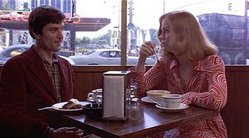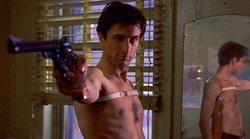Taxi Driver
Taxi Driver is a 1976 American motion picture drama directed by Martin Scorsese. more...
It is widely considered one of the greatest American films, praised for its strong performances and gritty realism. The film also made stars out of both its lead actor, Robert De Niro, and Jodie Foster, then fourteen years old.
Bernard Herrmann, who is noted for his work with Alfred Hitchcock (especially Psycho), scored Taxi Driver. The soundtrack was the last he completed before his death.
Primary cast:
- Robert De Niro : Travis Bickle
- Jodie Foster : Iris Steensma
- Cybill Shepherd : Betsy
- Harvey Keitel : 'Sport' Matthew
- Peter Boyle : Wizard
- Leonard Harris : Sen. Charles Palantine
- Albert Brooks : Tom
Plot summary
Travis Bickle (De Niro) is an alienated, sexually frustrated young man of 26 from the Midwest, who claims that he has recently been discharged from the Marines. He suffers from insomnia and consequently takes a job as taxi driver in New York City, and volunteers to work the overnight shift "anytime, anywhere". Bickle spends his spare time watching pornography in seedy theaters and driving around aimlessly through the darkest and most repulsive neighborhoods of Manhattan.
Bickle is horrified by what he considers the moral decay around him, and when Iris (Foster), a 12½ year-old prostitute, gets in his cab one night to escape her pimp, Bickle becomes obsessed with saving her despite her complete lack of interest in the idea, explaining that she was "stoned" when she tried to escape, and her pimp, Sport, is actually a kind and caring person.
Bickle is also obsessed with Betsy (Shepherd), an aide for New York State Senator Palantine, who is running for the presidential nomination and is promising dramatic social change. She is initially intrigued by Bickle and agrees to a date with him after he flirts with her and sympathizes with her own apparent loneliness. On the date, however, Bickle takes her to a pornographic film (Kärlekens Språk), and she leaves him, disgusted.
Taxi Driver has a number of other disturbing scenes reflecting both Bickle's worsening mental condition and the seedier side of New York City. Bickle purchases four handguns from an energetic black market "salesman" named Easy Andy. Another scene features a disturbed businessman in the back of Travis' cab (played by Scorsese in a last-minute substitution) explaining to Travis how he wishes to kill his wife, who is playing around with a paramour. Bickle happens across a robbery at a convenience store where he is a regular customer, then shoots the would-be robber. The store clerk then proceeds to beat the robber's dead (or dying) body in full view of any passersby. Bickle writes a letter to his parents, claiming to be involved in "sensitive" government work; he also reports to them that he is dating Betsy. Obviously desperate, Bickle tries to express his frustration to Wizard (Boyle), an older more experienced cabbie, telling Wizard "I got some bad ideas in my head" and that he feels like "doing something big"; not comprehending, Wizard tries to relate from his experience, but can ultimately only suggest that Bickle should "get laid, get drunk" and "don't worry so much."
The film's most famous scene may be when Bickle is practicing his quick-draw technique and rehearsing a speech he'll deliver if confronted: "You talkin' to me? You talkin' to me? You talkin' to me? Then who the hell else are you talkin' to? You talkin' to me? Well, I'm the only one here."
Bickle then plans to assassinate Senator Palentine at a public rally, perhaps seeing the Senator as a buffer between himself and Betsy. When he is spotted by Secret Servicemen and flees, Bickle desperately drives uptown and shoots Iris's pimp Sport (Keitel), before storming into the brothel and brutally killing the bouncer, the wounded Sport (who has returned), and Iris's mafioso customer.
Read more at Wikipedia.org


